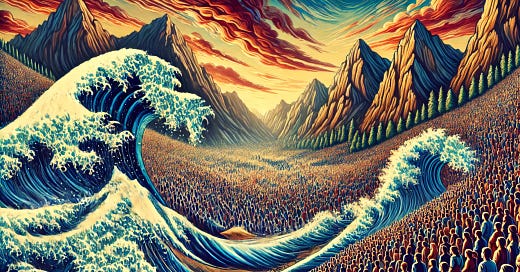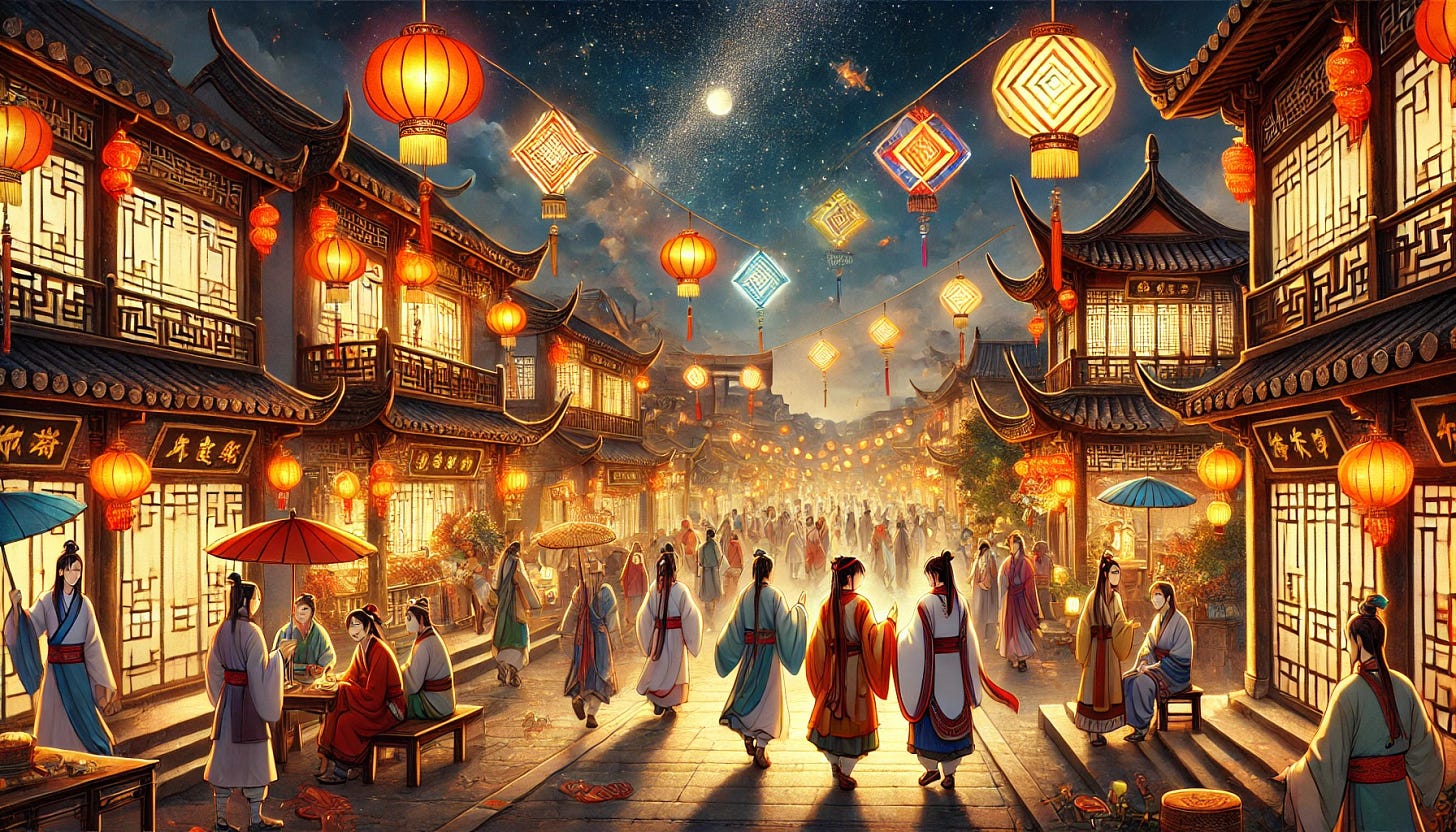《人山人海的故事》"People Mountain, People Sea" The story - Intermediate
How do you describe a large crowd in Chinese?
In Chinese, there are several vivid and expressive ways to describe a crowd. One of the most visually captivating expressions is 人山人海 (rén shān rén hǎi), which literally translates to "people mountain, people sea." This phrase paints a powerful image of a vast, bustling crowd, likening the multitude of people to towering mountains and expansive oceans.
This expression is a testament to the richness and visual nature of the Chinese language. It not only conveys the sheer number of people but also evokes a sense of overwhelming presence and activity. The use of natural elements like mountains and seas in this idiom highlights the Chinese language's ability to create vivid mental pictures, making descriptions more engaging and memorable.
Understanding and using such expressions can greatly enhance your Chinese language skills, allowing you to communicate more effectively and with greater nuance. Let's delve deeper into the world of Chinese idioms and explore how they bring language to life.
《人山人海的故事》
很久以前,有一个繁华的都市,名叫长安。每年中秋节,长安都会举办盛大的灯会,吸引着四面八方的游客。
有一年,中秋节前夕,一位名叫李白的年轻诗人来到长安。他听说这里的灯会人山人海,想亲眼看看这热闹非凡的盛况。
到了中秋夜,长安街道挂满了彩灯,花灯像天上的星星一样明亮。李白和朋友们漫步在长安城,观赏着各式各样的灯笼,听着街边艺人的表演。
渐渐地,随着夜色加深,人潮越来越密集。李白看到整个城里的街道、广场都挤满了欢笑的人群。每个角落都充满了兴奋和喜悦。他感叹道:“这真是人山人海啊!”
此后,李白在他的诗作中提到这次难忘的经历,成语“人山人海”也因此流传开来,成为形容人群密集非常形象的表达。
这个故事便是关于成语“人山人海”的一个美丽传说。不仅展示了成语的含义,也反映了古人在节日期间的欢乐时光。
请注意:如果你是母语者,请通过Substack留言指出错别字或语法问题,以便保持帖子质量。感谢合作!
Download story PDF file HERE.
These PDFs are designed to help you immerse yourself fully in the language, focusing on reading and comprehension without Pinyin or vocabulary lists. You can download, print them out, and use them for study and review at your own pace.
Story breakdown by paragraph with vocabulary and audio
繁华 (fán huá) = flourishing, bustling
都市 (dū shì) = city, metropolis
长安 (cháng ān)= A famous city in Chinese history known as the capital city during several important Chinese dynasties. It was one of the most significant cultural, political, and economic centers in ancient China.
中秋节 (zhōng qiū jié) = the mid-autumn festival
都会 (dū huì) = metropolis (Note: 都会 can be used interchangeably with 都市, but it’s less common. 都会 usually refers to metropolitan areas or big cities.)
举办 (jǔ bàn) = to hold (an event)
盛大 (shèng dà) = grand, majestic
灯会 (dēng huì) = lantern festival
吸引 (xī yǐn) = to attract
四面八方 (sì miàn bā fāng) [成语] = all around, far and near
游客 (yóu kè) = travelers, tourists
前夕 (qián xī) = the eve of or night before
李白 (lǐ bái) = One of the most famous and celebrated poets in Chinese history. He is known for his romantic and imaginative poetry, which often explores themes of nature, friendship, and the joys of life. His work has left a lasting legacy in Chinese literature.
诗人 (shī rén) = poet
听说 (tīng shuō) = to hear it said
亲眼看 (qīn yǎn kàn) = to see with one’s own eyes
非凡 (fēi fán) = unusual, extraordinary
盛况 (shèng kuàng) = grand occasion, magnificent event
Let’s take a closer look.
The translation shows the characters followed by English, arranged by meaning.
有一年 (one year),中秋节前夕 (on the eve of the Mid-Autumn Festival),一位名叫李白 (a person named Li Bai) 的年轻诗人 (a young poet) 来到长安 (arrived in Chang An)。他听说 (he heard that) 这里的灯会 (the lantern festival here) 人山人海 (had huge turnouts),想 (and wanted) 亲眼看看 (to see for himself) 这热闹非凡的 (this bustling and extraordinary) 盛况 (grand event)。
中秋夜 (zhōng qiū yè) = Mid-Autumn Festival night
挂满 (guà mǎn) = to be hung full of
彩灯 (cǎi dēng) = colorful lanterns
花灯 (huā dēng) = decorative lanterns
明亮 (míng liàng) = bright
漫步 (màn bù) = to walk slowly, stroll
观赏 (guān shǎng) = to enjoy the scene or view, admire
各式各样 (gè shì gè yàng) = various kinds, all kinds
灯笼 (dēng lóng) = traditional lanterns (usually made of bamboo and paper)
艺人 (yì rén) = artisans, performers
表演 (biǎo yǎn) = perfomance; to perform
Want a deeper dive into this or any Mapping Mandarin™ post? I offer personalized lessons to help you explore the content further.
I also provide one-on-one tutoring to enhance your Mandarin skills, improve pronunciation, reading comprehension, and clarify challenging grammar. Contact me to elevate your Mandarin learning!
渐渐地 (jiàn jiàn de) = gradually
随着 (suí zhe) = following, along with
夜色加深 (yè sè jiā shēn) = the darkening of the night scene
人潮 (rén cháo) = the flow of people, crowds
密集 (mì jí) = dense
整个 (zhěng gè) = the whole, entire
广场 (guǎng chǎng) = plaza, square
挤满了 (jǐ mǎn le) = tightly filled, crowded with
欢笑 (huān xiào) = happy and smiling
人群 (rén qún) = crowds, groups of people
角落 (jiǎo luò) = corner, nook
充满 (chōng mǎn) = to be full of
兴奋 (xīng fèn) = excitement
喜悦 (xǐ yuè) = joy, delight, happiness
人群 (rén qún) = groups of people, people
感叹 (gǎn tàn) = to sigh, exclaim
道 (dào) = to say, speak (used in dialogue)
Let’s take a closer look.
The translation shows the characters followed by English, arranged by meaning.
渐渐地 (gradually),随着 (as) 夜色加深 (the darkening of the night scene),人潮 (the flow of people) 越来越 (more and more) 密集 (dense)。李白看到 (Li Bai saw) 整个城里的街道 (the streets of the entire city)、广场(the square) 都挤满了 (was crowded with) 欢笑的人群 (cheerful crowds)。每个角落 (every corner) 都充满了 (was filled with) 兴奋 (excitement) 和喜悦 (and joy)。他感叹道 (He exclaimed):“这真是人山人海啊 (this is truly a sea of people)!”
此后 (cǐ hòu) = following this, after this
诗作中 (shī zuò zhōng) = in his poetry
提到 (tí dào) = to mention
难忘 (nán wàng) = unforgettable, hard to forget
经历 (jīng lì) = experience
因此 (yīn cǐ) = because of this, consequently
流传开来 (liú chuán kāi lái) = to spread widely, spread near and far
成为 (chéng wéi) = to become
形容 (xíng róng) = to describe
形象 (xíng xiàng) = vivid, graphic, descriptive, imagery
表达 (biǎo dá) = expression; to express
Let’s take a closer look.
The translation shows the characters followed by English, arranged by meaning.
此后 (after this),李白在他的诗作中 (Li Bai, in his poetry) 提到 (mentions) 这次 (this) 难忘的 (unforgettable) 经历 (experience),成语 (the idiom) “人山人海 (a sea of people)”也 (also) 因此 (because of this) 流传开来 (spread near and far),成为 (it became) 形容人群密集 (descriptive of large crowds) 非常 ([an] extremely) 形象的 (vivid) 表达 (expression)。
便是 (biàn shì) = is, exactly is
关于 (guān yú) = about, in regards to
传说 (chuán shuō) = legend
不仅 (bù jǐn) = not only
展示 (zhǎn shì) = to show, exhibit
含义 (hán yì) = meaning, implication, inference of meaning; to imply
反应 (fǎn yìng) = to reflect, react, respond
古人 (gǔ rén) = the people from classical times, ancient people
节日 (jié rì) = holidays, festivals
期间 (qī jiān) = during a period of
欢乐 (huān lè) = happiness, joy
时光 (shí guāng) = time, moments of time (a nostalgic or poetic sense of time)
Character Radical:
亻 = is the "人" (rén) radical, which means "person" or "people." This radical appears in several key characters that are central to the narrative about the bustling crowd during the Mid-Autumn Festival in Chang'an.
The "亻" radical, a variant of "人" (rén), is commonly found in characters related to people and their actions. Here are more characters from the story that include the "亻" radical:
人 (rén) - person, people
们 (men) - plural marker for people (e.g., 朋友们)
今 (jīn) - now, today (appears in the context of 今年, this year)
传 (chuán) - to spread (e.g., 流传)
例 (lì) - example (e.g., 例子)
会 (huì) - meeting, gathering (appears in 灯会)
Yin-yang Character Groups:
Yin-yang character groups illustrate the balance and complementary nature of concepts in the Chinese language. Here are three pairs:
长短 (cháng duǎn) - long and short
上下 (shàng xià) - up and down
昼夕 (zhòu xī) - day and night
Thanks for reading Mapping Mandarin™! I love doing this and want to keep all posts free for everyone. Please consider pledging to help keep them free. A yearly pledge or even a month now and then would be a great help. 感谢!
Also, check out my other Substack: Heart Of China Journal!
And the Master Mandarin YouTube channel!















